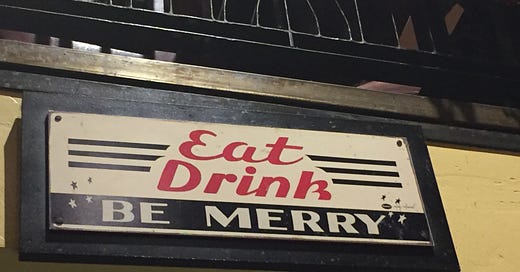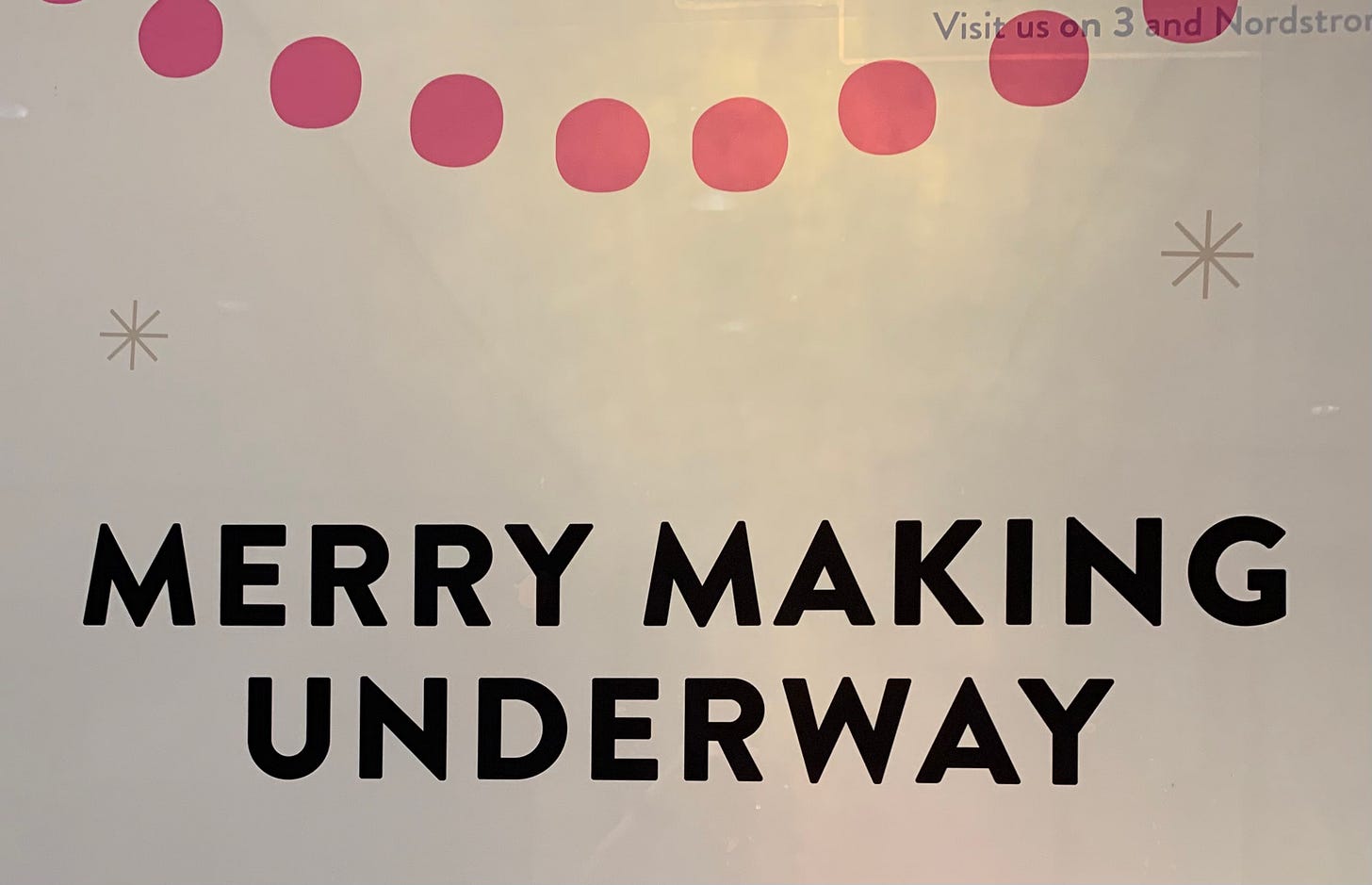How to Muddle through the Holidays
Some Science on How to Get the Most Out of Holidays and Vacations....
I don’t know about you, but I’m just about in full holiday mode. By that I don’t mean that I’m in the Christmas spirit as much as I’m distracted by everything on my to-do list and everything that isn’t on the list. Torn between that last push to get things done before the end of the year and the pull to go shopping for presents and the belief that, in a few days, no one will be getting anything done until January anyhow.
I’m apparently not the only one.
So whether you’re annoyed that you have to work rather than go see Santa, or you’re told you’re a Grinch because you hate the office holiday party, to paraphrase Judy Garland, let’s tackle how we can, for the next few weeks, muddle through somehow….
Are You Exhausted or a “Good Tired”?
Why is that the idea of one Christmas party sounds fun and the other sounds awful?
Have you ever noticed that you can do the exact same activity and sometimes you walk away rejuvenated and other times, you’re exhausted by it? Or perhaps after a vacation/big occasion you said, “I’m tired, but it’s a good tired.”
A Swiss research team has concluded that some of the difference is context—whether you’re doing it as leisure, i.e., voluntarily with no expected outcome—or as work that comes with a set location, obligations, money, and other high-stakes outcomes.
But it’s also because we expect work to wear us out and we expect leisure to help us recover from the drudgery of work. And then we look for the signs to show us both are coming true.
Are You in a Groove … or a Rut?
In a study published earlier this fall, a research team examined why people get stuck in ruts—why they continue to do things they know don’t bring them enjoyment.
Conducting a series of short experiments, this team found that about 20-25% of people given a task persisted in doing something, even when they could switch to a more enjoyable task. And the more people do something, the more it gets mentally entrenched, the more they keep doing it. And they do so, even if there are more positive, easier options presented to them. Because the idea of switching seems more difficult than persisting.
Entrenchment is, as the researchers proffered, why someone walking to a meeting will keep walking, even when they pass by a metro that will get them to their destination more quickly. Once our brains have sort of acclimatized themselves to a situation, the effort to switch seems harder than the task itself.
To break out of the rut, have interruptions early on so you don’t get so entrenched.
On the other hand, if you have a boring task you need to focus on and get done, eliminate the distractions from the start so you increase your entrenchment.
Quick Looks
Speaking of distractions, according to a 2016 survey, the average person in the US looks at their phone 47 times a day, but for 18-24 year olds, it’s about 82 times a day.
“e-lienation” — the term a pair of researchers came up with to describe the sense of alienation people felt when they were going without their phones and other devices that bring instant connectivity. Something people said they felt, even when they were doing a self-imposed “digital detox.”
Normally, bank officers are said to make better decisions about a person’s ability to repay a debt, if they have access to “soft information,” insight into what’s going on in a debtor’s life. However, on study found that, the week before a national holiday, soft information leads them to make somewhat worse decisions.
I Knew There Was a Reason I Always Want a Real Tree….
In light of earlier research about the nature’s restorative qualities on people’s mood, stress, etc., the “Real Christmas Tree Board” (i.e., a tree farmer group*) commissioned a West Virginia University research team to test the restorative impact of seeing Christmas trees through a survey and experiment.
The research team found that pictures of both indoor artificial and outdoor real trees had a restorative effect, but we sort of more of a fascination when seeing fake trees, and more of a “Ahhh… trees” when seeing real Christmas trees. So seeing real trees, outside had triple the impact.
So indoor malls could make customers happier if they made their displays look more like a forest.
And if the hustle-and-bustle of the season is getting to you, maybe go spend some time wandering round a tree lot or tree farm and — just as I’m sure the tree farmers hoped I’d say!—buy a real tree. Apparently that does count as nature.
Vacation, All I Ever Wanted, Vacation, Had to Get Away 1
The U.S. is the only industrialized nation that doesn’t have legally mandated vacations. However, a survey of 200,000 Americans (and controlling for their income and hours worked), those who went on vacations are happier and higher in life satisfaction.
There’s surprisingly little scientific consensus on what is the ideal length for a vacation. Similarly, there’s debate on what factors determine if the positive glow from a vacation lasts longer than the tan you bring back from the beach.
One research team believes some of that may be explained by the fact that people’s activities vary, depending on the trip’s length. Short trips tend to be more passive and restful, longer vacations tend to be more active.
But it doesn’t take much.
In a series of three experiments where people were instructed to “treat the weekend like a vacation,” they did seem to approach their two days off differently (they spent about $15-20 more). They reported that they were more mentally present and engaged in their weekend’s activities. They were happier during the weekend and when they went back to work on Monday.
Re-entry also matters. While many people may want to lengthen the vacation with a weekend and come back on a Monday, at least one study found that the post-vacation glow lasted longer if people came back to work mid-week.
Another factor that fades the post-vacation glow: the items on the to-do list.
In a study of white collar workers over a period of 15 weeks, including before and after a Christmas vacation, those who had fewer unfinished items on the to-do list when they came back from work had a longer post-vacation positive affect. Additionally, those who still did fun things or relaxed during post-Christmas weekends, rather than spent January running around, also did better, longer.
In Your Sight
According to a 2021 study, those who believe that leisure is wasteful (i.e., they have better, more important things they should be doing with their time) do enjoy it less. But they also report lower levels of happiness and higher levels of depression, anxiety, and stress.
Researchers who conducted a recent meta-analysis of “micro-breaks,” breaks shorter than 10 minutes, concluded that those short breaks may help restore vigor but aren’t usually enough to improve cognitive performance.
In a study of US and UK teachers, those who were more perfectionistic were more stressed and anxious prior to a week break, but, during their vacation, they were able to relax as much as their colleagues—as long as they refrained from work. But if the perfectionists worked for seven or more hours cumulatively over the span of the vacation, their depression and anxiety levels were roughly as high as if they hadn’t had a break at all.
Tis “my” season, and I wish you all very merry one!
For the GenXers in the room now stuck with a nostalgic earworm, sorry! And here ya go.










Great one thank you,